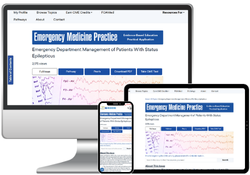Why Clinicians Subscribe
- Stay compliant with CME requirements, including stroke and trauma credits
- 190+ CME hours per year—earn while you learn
- Rigorous, evidence-based research with no advertising
- Quick answers on shift with practical algorithms and clinical calculators
- Fast takeaways with Points & Pearls summaries for rapid review
- Confidence at the bedside with Interactive Clinical Pathways
- Advice designed for your learning style with online, searchable topics, print issues for reading when you don’t have online access, and podcast audio content for listening while you’re on the go
- Unlimited access to our complete issue library —hundreds of issues at your fingertips to answer the toughest clinical questions
Subscribers tell us they value Emergency Medicine Practice not just for CME, but for the peace of mind it provides. With so many conflicting sources of information, it’s hard to know what you can rely on. Emergency Medicine Practice eliminates the noise by distilling thousands of articles into the key studies that matter for patient outcomes. The result is more confidence on shift, fewer wasted hours chasing the latest best practices, and the assurance that you’re staying ahead of clinical guidelines. Plus, you get learning that sticks—content and advice that is practical and boosts your knowledge.
Your Subscription Includes
- 12 monthly issues (delivered in print and online)
- EXTRA issues that are topic-focused on stroke, trauma, and pharmacology
- CME credit tracking—automatic, seamless, and easy to download for reporting
- Full online access to our complete issue library, covering hundreds of topics
- EMplify podcast, where our editors bring the peer-reviewed depth of each issue to life in a conversational, engaging audio format
The flexibility of your subscription is designed around the unpredictable life of an emergency clinician. Print copies can be marked up and kept at your workstation; online access gives you searchable content from any computer or mobile device; and with the EMplify podcast, you can turn commute time or post-shift decompression into high-yield learning. Whatever your workflow looks like, Emergency Medicine Practice fits in seamlessly.
How Emergency Medicine Practice Helps You On Shift
Emergency medicine clinicians know that no two shifts are the same. One night may bring a string of intoxicated patients, the next a stroke code followed by a pediatric trauma. Emergency Medicine Practice equips you with practical strategies for these unpredictable scenarios.
- Before your shift: Review the latest Points & Pearls to refresh key clinical takeaways in minutes.
- During your shift: Access algorithms and interactive clinical pathways to guide decisions under pressure.
- After your shift: Claim CME credits for the issues you’ve completed and track your progress for licensing or hospital requirements, or listen to the EMplify podcast for on-the-go learning
By building learning into your daily workflow, Emergency Medicine Practice saves you time and improves patient care so you can practice at the top of your field.
Trusted by Thousands of Emergency Clinicians
More than 10,000 emergency medicine physicians, residents, and advanced practice providers subscribe to Emergency Medicine Practice. Many have been with us since our first issue in 1999. That loyalty reflects the trust clinicians place in our evidence-based, peer-reviewed approach and our dedication to staying clinically relevant.
Unlike other CME sources that recycle outdated material or offer surface-level overviews, Emergency Medicine Practice dives deep into one high-yield topic each month. That focus means you walk away with actionable recommendations, not just background knowledge, that reflect the latest evidence-supported best practices.
Accreditation You Can Count On
EB Medicine, publisher of Emergency Medicine Practice, is accredited by the Accreditation Council for Continuing Medical Education (ACCME). All issues are designed to meet state and federal CME requirements, including those for stroke and trauma centers.
This makes Emergency Medicine Practice not only a trusted educational tool but also a reliable way to stay compliant with credentialing and hospital mandates.















































